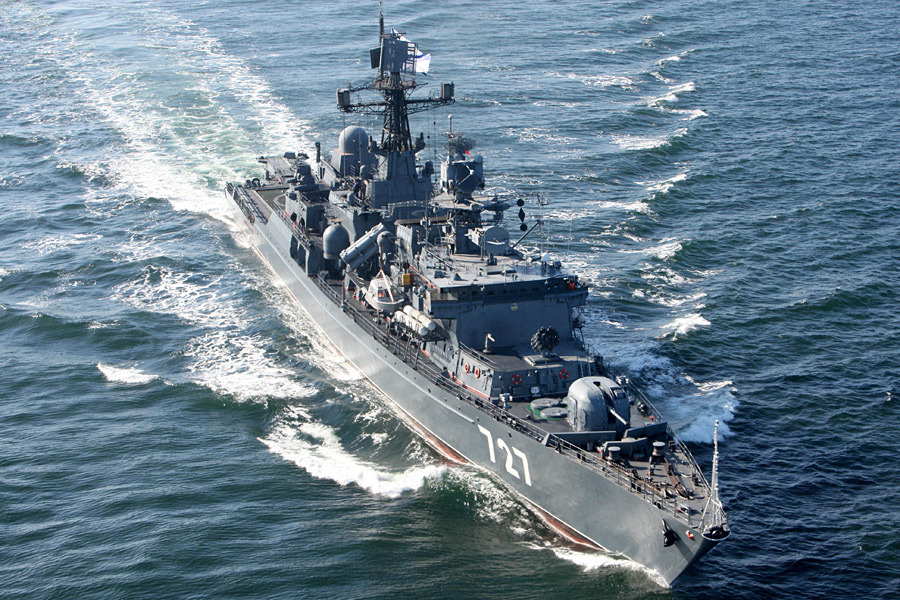
Russian Policy on Iran and Syria in State of Disarray
Publication: Eurasia Daily Monitor Volume: 9 Issue: 157
By:

Last month, the Russia Navy announced it was assembling a task force in the Mediterranean: one frigate, two corvettes, five landing craft with Marines on board, two rescue tugs and one tanker. Three of the landing craft were from the Northern Fleet and two from the Black Sea Fleet. It was announced the Russian flotilla will perform exercises and will be prepared “to defend Russian shipping in the event of a naval blockade,” presumably of Syria by NATO naval forces (RIA Novosti, July 11). By the end of July, the two landing ships from the Black Sea fleet returned to Sevastopol, but the rest continued to cruise the Mediterranean (RIA Novosti, July 28). This month, an unnamed Defense Ministry official told journalists in Moscow during a background briefing that the three landing craft from the North Fleet remaining in the Mediterranean “are planned to dock in Tartus” – the Russian naval base in Syria. The official confirmed that each landing craft is carrying “a reinforced company of Marines (120 men) and APCs [armored personnel carriers]” (Interfax, August 3). After docking in Tartus, the Russian military command was reportedly planning to send its ships into the Black Sea to dock at Novorossiysk naval base. According to the Defense Ministry official, “while Syrian President Bashar al-Assad is in power,” Russia may keep the strategically important base in Tartus, but it would be lost if the opposition wins, “since they will not forgive Moscow’s support of Assad.” The eviction from Tartus “would mean the loss of any influence in the Mediterranean” and be almost as bad as a possible eviction from Sevastopol (Interfax, August 3).
A couple of days later and without explanations, the navy announced its ships will not go to Tartus. Instead, after receiving fuel out at sea from a naval tanker “Ivan Bubnov” that in turn picked up the fuel in Limassol, Cyprus, the small Russian flotilla in the Mediterranean will go directly to Novorossiysk – its arrival expected on August 12 (RIA Novosti, August 7). This week, Russian naval plans U-turned again without explanation: The Russian Mediterranean flotilla, decreased in size to 3 landing craft, 2 corvettes, a tanker and a seagoing tug, headed away from Syria not to Novorossiysk, but “to the Western Mediterranean to continue exercises” (RIA Novosti, August 13). At present the Russian amphibious task force passed Sicily and is deployed off Sardinia, “training to defend its convoy order from a sudden air attack or terrorists” (RIA Novosti, August 14).
The true meaning of the seemingly erratic Russian naval maneuvers in the Mediterranean has baffled observers in Moscow and is seen as a sign of weakness and indecisiveness in the face of the US “enemy” (Nezavisimoye Voyennoe Obozrenie, August 3). As the Assad regime is showing clear signs of disintegration, Russia’s ruling elite has seemingly lost a clear vision on what to do next. The Russian warships that seemed posed to land armed Marines in Tartus and a couple of days later sped away toward the shores of Spain may reflect infighting within Moscow. The internal dispute is to ether distance Russia from the Syrian crisis or stand by al-Assad to the bloody end, risking a humiliating exposure of weakness – after all, the small flotilla of outdated Russian ships without air cover and several hindered Marines cannot accomplish much militarily in Syria or the Eastern Mediterranean.
In another possible sign of growing divisions, this week the Saudi daily Al-Wattan published a telephone interview with Russia’s Deputy Foreign Minister Mikhail Bogdanov who, earlier this year, was put in charge of Russian Middle Eastern policies. Al-Wattan quoted Bogdanov as stating the brother of Bashar and commander of the Republican Guard, Mahar al-Assad, was severely wounded (lost both legs) in the explosion in Damascus on July 18 that killed a number of top Syrian generals. The maiming of Mahar, according to Bogdanov, seriously affected Bashar al-Assad, who is considering the possible terms of resigning from power (www.alwatan.com.sa, August 14). Bogdanov is known in Moscow to be a promoter of a more balanced, non-confrontational Middle Eastern policy. The Russian Foreign Ministry dismissed the Al-Wattan publication as “deliberate disinformation and provocation.” The audio file of the interview with Bogdanov, published by Al-Wattan as proof, has been declared “an unprofessional fabrication,” since Bogdanov “did not give Al-Wattan any interview” or speak about Bashar or Mahar al-Assad (RIA Novosti, August 15).
On the Syrian crisis Russia and Iran seemed to be working together, trying to keep the Assad regime in power, but the relationship appears increasingly strained. Last month, it became known that Iran is suing Russia for damages to the tune of some $4 billion in the Court of Arbitration in Geneva for canceling in 2010 a contract to sell five divisions of the S-300 long-range anti-aircraft missile system worth an estimated $800 million to $1 billion (see EDM, July 26). In an interview this month, the Iranian Ambassador in Moscow, Seyyed Mahmoud Reza Sajjadi, announced that Iran was seeking “only $900 million, while the Swiss arbitrators added $3 billion on their own.” According to Sajjadi, Tehran in fact does not want any money at all, but instead Moscow must resume the S-300 contract it canceled because of UN sanctions (Izvestia, August 1).
Again, Russia’s rulers seem to be split on how to proceed. This week, the Foreign Ministry has officially deplored the latest US sanctions against Iran as “unilateral and unacceptable blackmail.” Moscow insists it is complying with existing UN sanctions and that ”bilateral relations will be seriously affected” if Russian companies and banks doing legitimate business with Iran will be punished by the United States (www.mid.ru, August 13). Moscow is angry at Tehran too: Sources in the Kremlin are quoted as threatening to “stop supporting Iran on the nuclear issue” if it does not stop litigation on the S-300 immediately. Sajjadi’s explanations have not been accepted, and Moscow is planning to send to Tehran a top delegation to demand the case in Geneva be dropped, or “the Iranians will be on their own in dealing with the nuclear issue and the contact group of six [the five permanent UN Security Council members and Germany]” (Kommersant, August 10). President Vladimir Putin has maneuvered Russia into a position in which it seems to have virtually no friends left at all.




